
ai_summer
Summary repository for AI Summer 2024
Stars: 59
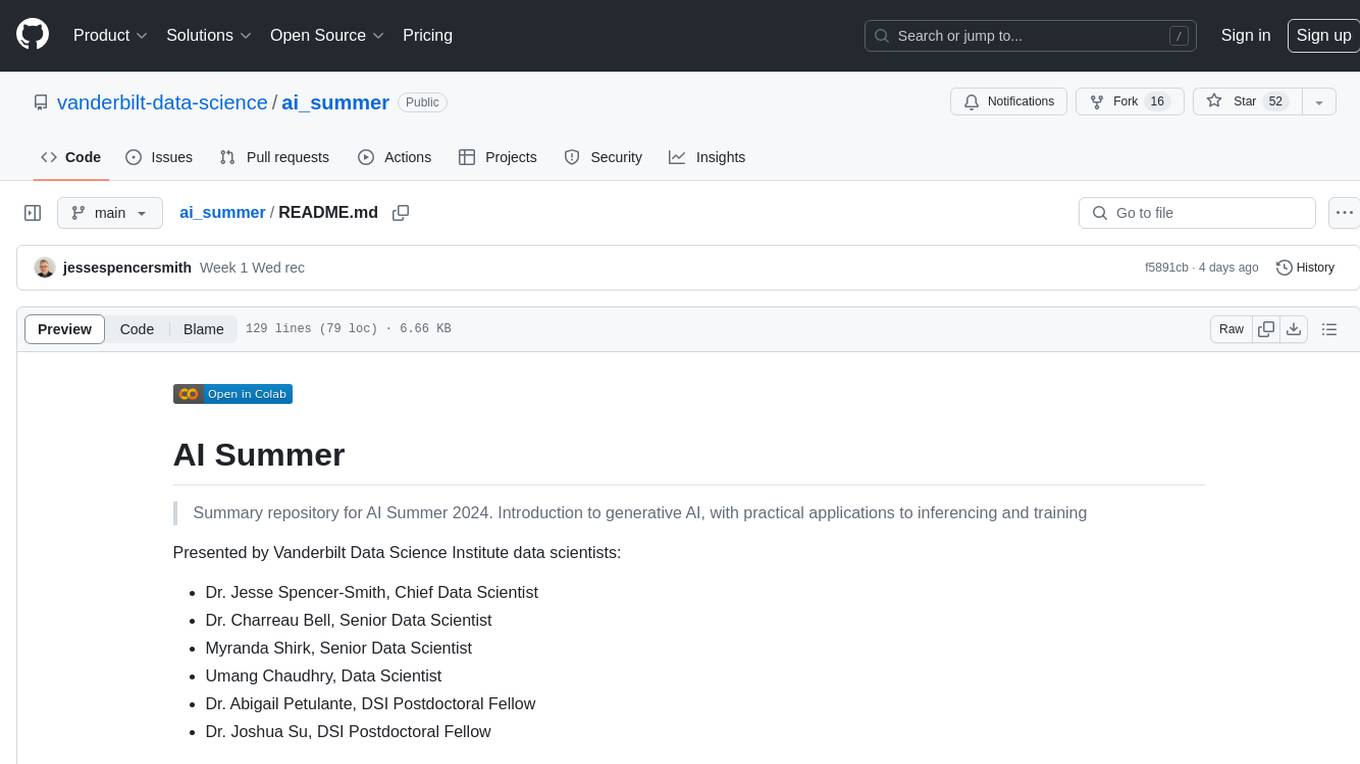
AI Summer is a repository focused on providing workshops and resources for developing foundational skills in generative AI models and transformer models. The repository offers practical applications for inferencing and training, with a specific emphasis on understanding and utilizing advanced AI chat models like BingGPT. Participants are encouraged to engage in interactive programming environments, decide on projects to work on, and actively participate in discussions and breakout rooms. The workshops cover topics such as generative AI models, retrieval-augmented generation, building AI solutions, and fine-tuning models. The goal is to equip individuals with the necessary skills to work with AI technologies effectively and securely, both locally and in the cloud.
README:
Summary repository for AI Summer 2024. Introduction to generative AI, with practical applications to inferencing and training
Presented by Vanderbilt Data Science Institute data scientists:
- Dr. Jesse Spencer-Smith, Chief Data Scientist
- Dr. Charreau Bell, Senior Data Scientist
- Myranda Shirk, Senior Data Scientist
- Umang Chaudhry, Data Scientist
- Dr. Abigail Petulante, DSI Postdoctoral Fellow
- Dr. Joshua Su, DSI Postdoctoral Fellow
The objective of these workshops is to develop foundational skills in understanding, inferencing and training generative AI models and other transformer models.
Practice your Python skills using the below documents. Choose either a Google Colab for interactive programming environment, or alternatively read through the Google Doc.
You’ll want to use the most advanced AI chat model that you can get access to. Microsoft just opened access to BingGPT through Bing Chat, which is based on an early version of GPT4, currently the most advanced AI chat model available to the public. You’ll need to install the Edge browser (https://www.microsoft.com › edge › download) and go to bing. com. Click on “Chat”.
Think about any data you might want to bring to the workshop. Also begin thinking about any projects you might want to accomplish during our month. We’ll have office hours for you to work with us to get your first project off the ground!
Session will run live from 9am-11am, with an office hour from 11am to noon (all times Central).
No class Friday (Vanderbilt Commencement)
Weeks 2, 5/13 - 5/17: Retrieval-Augmented Generation (RAG), Assistants, Agents, and Intro to Diffusion Models
Week 3, 5/20 - 5/24: Building AI Solutions, Running AI Securely Locally or in the Cloud, Introduction to Training Models
Monday:
-
Homework: Watch the following videos: General Backprop and (math-centric backprop](https://youtu.be/tIeHLnjs5U8?si=mnT36GTL7YqU8qBO)
Wednesday: Recording: (https://vanderbilt.zoom.us/rec/share/fswTlpFMlqAVgxRDDBza920i9brAuxaSiteHpDNUwpm9YQzedJa5g_2oZSSr2Eq1.wF73yKYGD5eY3cyY?startTime=1716392393000)
Friday: Recording: (https://vanderbilt.zoom.us/rec/share/plozihJcLFBIfjPxQ8Bsv9IdqHh39qFinkVUChsYtuiuiGAc8O2TcvTEbTE5cAUW.3XYBPJfbdZJ1GzAS?startTime=1716558902000)
No class Monday (Memorial Day)
Wednesday:
Papers/Blogs discussed:
https://arxiv.org/pdf/2405.17247
https://proceedings.mlr.press/v139/radford21a/radford21a.pdf
https://arxiv.org/pdf/2405.09818
https://arxiv.org/pdf/2304.10592
https://arxiv.org/pdf/2310.03744
https://huggingface.co/papers/2311.05437
https://arxiv.org/pdf/2311.05437
https://llava-vl.github.io/blog/2024-01-30-llava-next/
https://llava-vl.github.io/blog/2024-05-10-llava-next-stronger-llms/
https://llava-vl.github.io/blog/2024-04-30-llava-next-video/
https://arxiv.org/abs/2310.02239
Remember we are all learning and exploring
- Please share your video upon entering the room and unmute
- Share your screens--someone volunteer to share their screen upon entering, and everyone be ready to share your screen to show what you’ve found
- Make notes of what you’ve discussed in the Response Reports below
- Everyone be ready to report out (random)
- Make some friends
- Breakout Rooms Worksheets
Google Docs has a limit of 100 people viewing/editing a document at one time.
Please be sure your display name is set in Zoom. If you are in one of the following special groups, please pre-pend your name with one of the following qualifiers.
- Data Science for Social Good: DSSG
- Center for AI in Protein Dynamics: Protein
- If you are in a lab and would like your own breakout room: Labname (keep it short, please!)
- If you are faculty and would like to be in a breakout room with other faculty: Faculty
For example, I might be DSSG-Jesse Spencer-Smith
Video recordings of these workshops can be found on our YouTube channel AI Summer playlist
Looking for the code resources for Summer 2023? View the 2023 repo version here.
- Prompt Engineering paper https://arxiv.org/abs/2302.11382
- Prompt Engineering Courserea Course: https://www.coursera.org/learn/prompt-engineering
- Visual overview of Generative AI from 3Blue1Brown: https://www.youtube.com/watch?v=wjZofJX0v4M
- Semester-long course on transformer models, DS 5690. Graduate students and advanced undergraduates can register by contacting me. I welcome auditing by a select number of postdoctoral fellows, and drop-ins from faculty!
DGX A100 Compute Grant: https://forms.gle/2mGfEy9DB4JU2GpZ8
- Natural Language Processing with Transformers by Lewis Tunstall, Leandro von Werra and Thomas Wolf. If you are affiliated with Vanderbilt University, you can access this pre-print book (and any book by O’Reilly) free by logging into O'Reilly Media using your Vanderbilt email address. Vanderbilt licenses all content from O’Reilly. The book covers Transformers for purposes beyond text.
To get the most out of this workshop:
- Open Colab (workbook) notebooks and actively write code along with the instructor
- Actively participate in discussions
- Actively participate in breakout rooms
- Work on homework assignments before coming to class
- Relax your mind and ask questions
- Open the Edge browser (yes, Edge) and navigate to www.bing.com
- Select "chat". A new window should open saying you need the new Bing.
- Select "Start chatting" at the bottom of this window. This should prompt you to sign in to a Microsoft account. Do not use an organizational/school email (such as Vanderbilt). Instead, select "No account? Create a new one" and create one with your personal email. Note: if you get stuck in the "use the new Bing" window, go back to Bing.com and select "Sign in" instead. Follow instructions for Step 3.
For Tasks:
Click tags to check more tools for each tasksFor Jobs:
Alternative AI tools for ai_summer
Similar Open Source Tools

ai_summer
AI Summer is a repository focused on providing workshops and resources for developing foundational skills in generative AI models and transformer models. The repository offers practical applications for inferencing and training, with a specific emphasis on understanding and utilizing advanced AI chat models like BingGPT. Participants are encouraged to engage in interactive programming environments, decide on projects to work on, and actively participate in discussions and breakout rooms. The workshops cover topics such as generative AI models, retrieval-augmented generation, building AI solutions, and fine-tuning models. The goal is to equip individuals with the necessary skills to work with AI technologies effectively and securely, both locally and in the cloud.
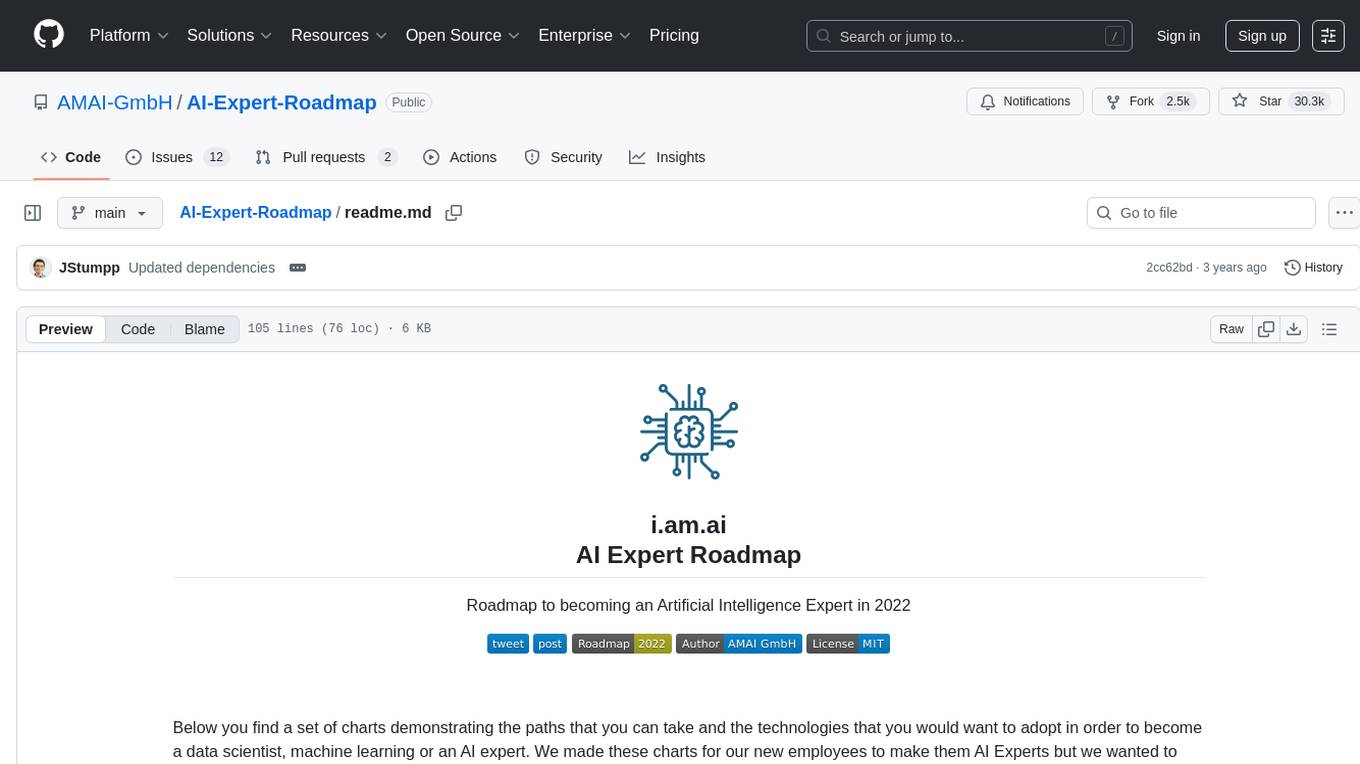
AI-Expert-Roadmap
AI Expert Roadmap is a comprehensive guide to becoming an Artificial Intelligence Expert in 2022. It provides detailed charts and paths for individuals interested in data science, machine learning, and AI. The roadmap covers fundamental concepts, data science, machine learning, deep learning, data engineering, and big data engineering. Created by AMAI GmbH, this resource aims to help individuals navigate the AI landscape and make informed decisions about their learning path. The interactive version with links is available at i.am.ai/roadmap. Stay updated by starring and watching the GitHub repo for new content.
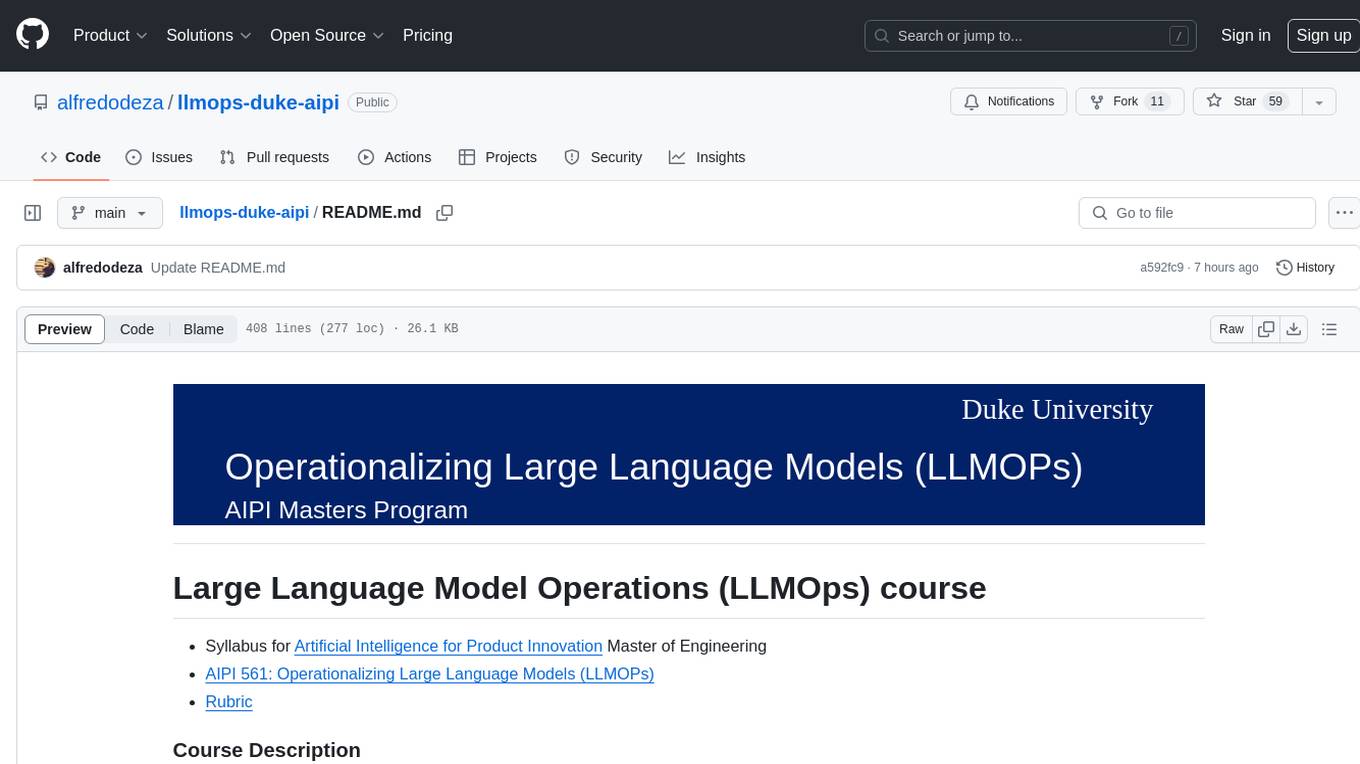
llmops-duke-aipi
LLMOps Duke AIPI is a course focused on operationalizing Large Language Models, teaching methodologies for developing applications using software development best practices with large language models. The course covers various topics such as generative AI concepts, setting up development environments, interacting with large language models, using local large language models, applied solutions with LLMs, extensibility using plugins and functions, retrieval augmented generation, introduction to Python web frameworks for APIs, DevOps principles, deploying machine learning APIs, LLM platforms, and final presentations. Students will learn to build, share, and present portfolios using Github, YouTube, and Linkedin, as well as develop non-linear life-long learning skills. Prerequisites include basic Linux and programming skills, with coursework available in Python or Rust. Additional resources and references are provided for further learning and exploration.
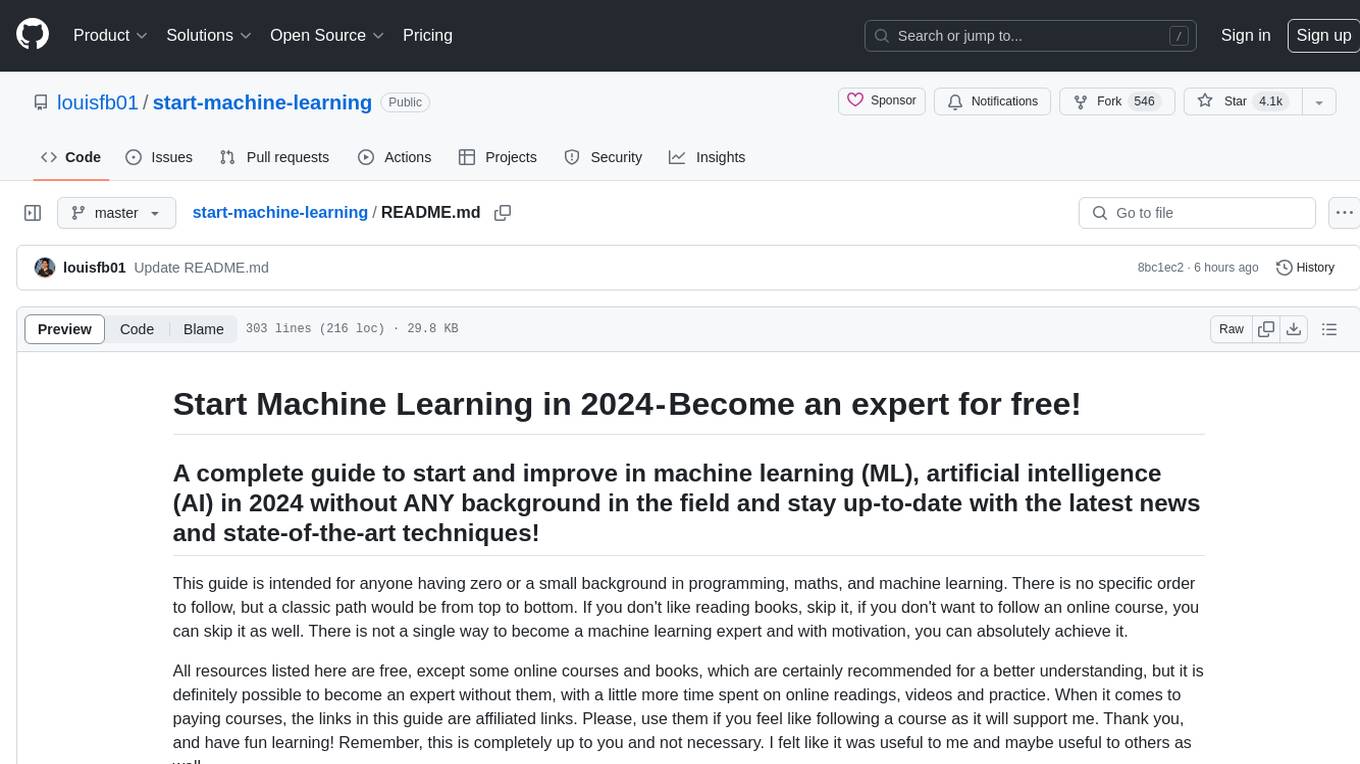
start-machine-learning
Start Machine Learning in 2024 is a comprehensive guide for beginners to advance in machine learning and artificial intelligence without any prior background. The guide covers various resources such as free online courses, articles, books, and practical tips to become an expert in the field. It emphasizes self-paced learning and provides recommendations for learning paths, including videos, podcasts, and online communities. The guide also includes information on building language models and applications, practicing through Kaggle competitions, and staying updated with the latest news and developments in AI. The goal is to empower individuals with the knowledge and resources to excel in machine learning and AI.
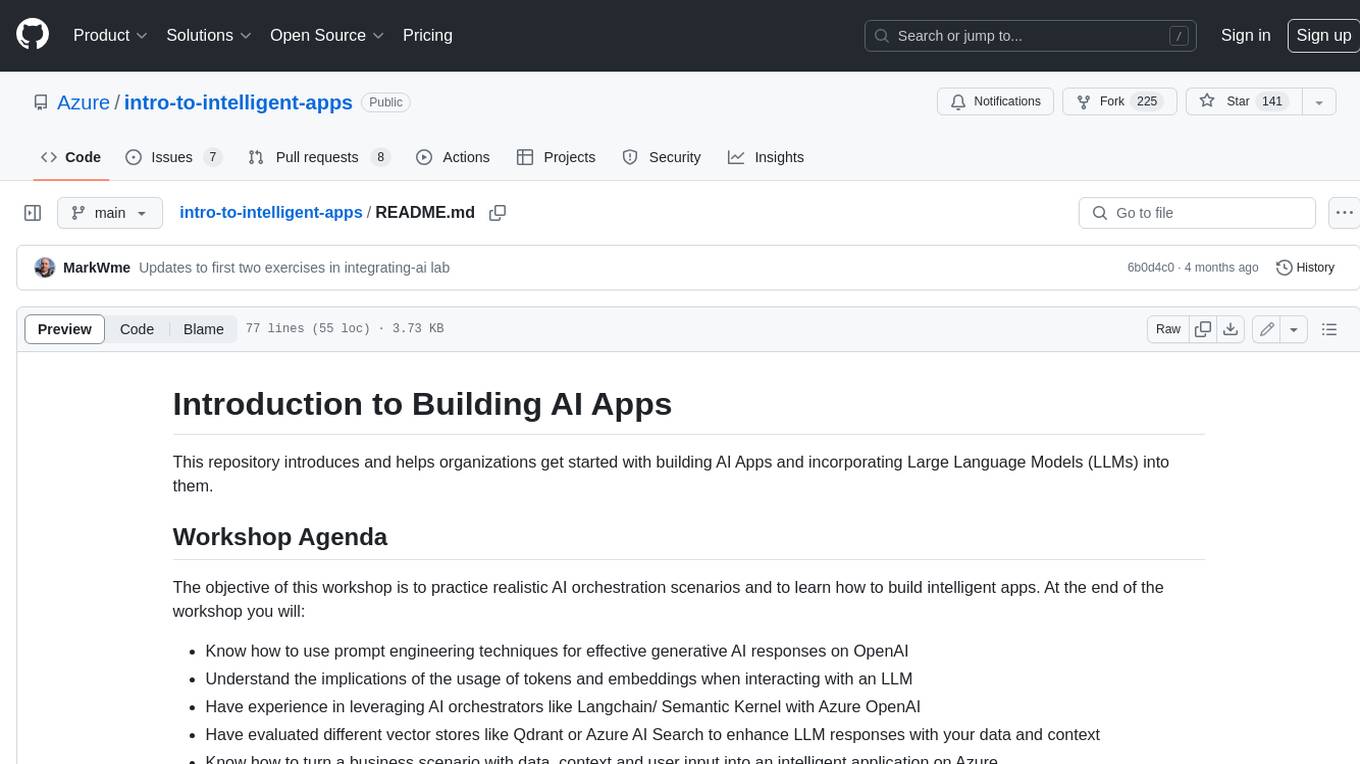
intro-to-intelligent-apps
This repository introduces and helps organizations get started with building AI Apps and incorporating Large Language Models (LLMs) into them. The workshop covers topics such as prompt engineering, AI orchestration, and deploying AI apps. Participants will learn how to use Azure OpenAI, Langchain/ Semantic Kernel, Qdrant, and Azure AI Search to build intelligent applications.
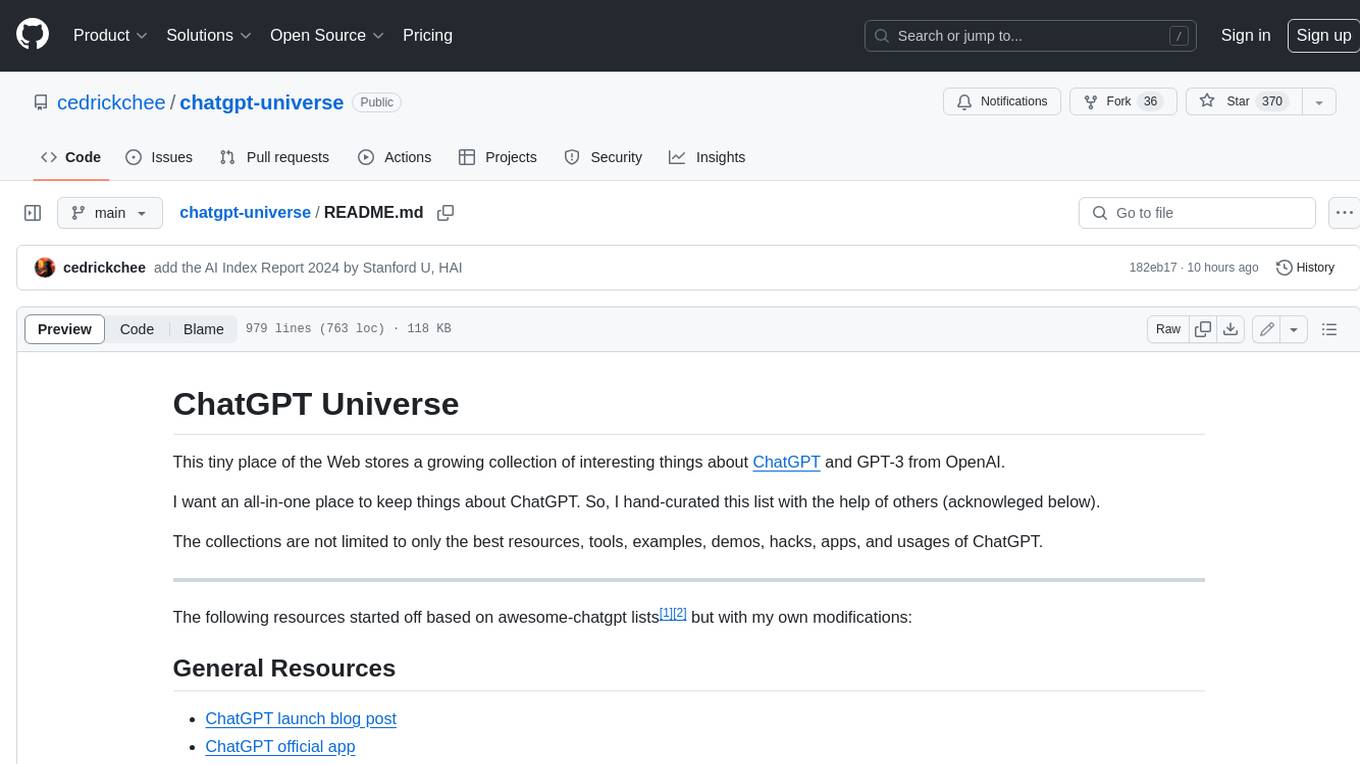
chatgpt-universe
ChatGPT is a large language model that can generate human-like text, translate languages, write different kinds of creative content, and answer your questions in a conversational way. It is trained on a massive amount of text data, and it is able to understand and respond to a wide range of natural language prompts. Here are 5 jobs suitable for this tool, in lowercase letters: 1. content writer 2. chatbot assistant 3. language translator 4. creative writer 5. researcher
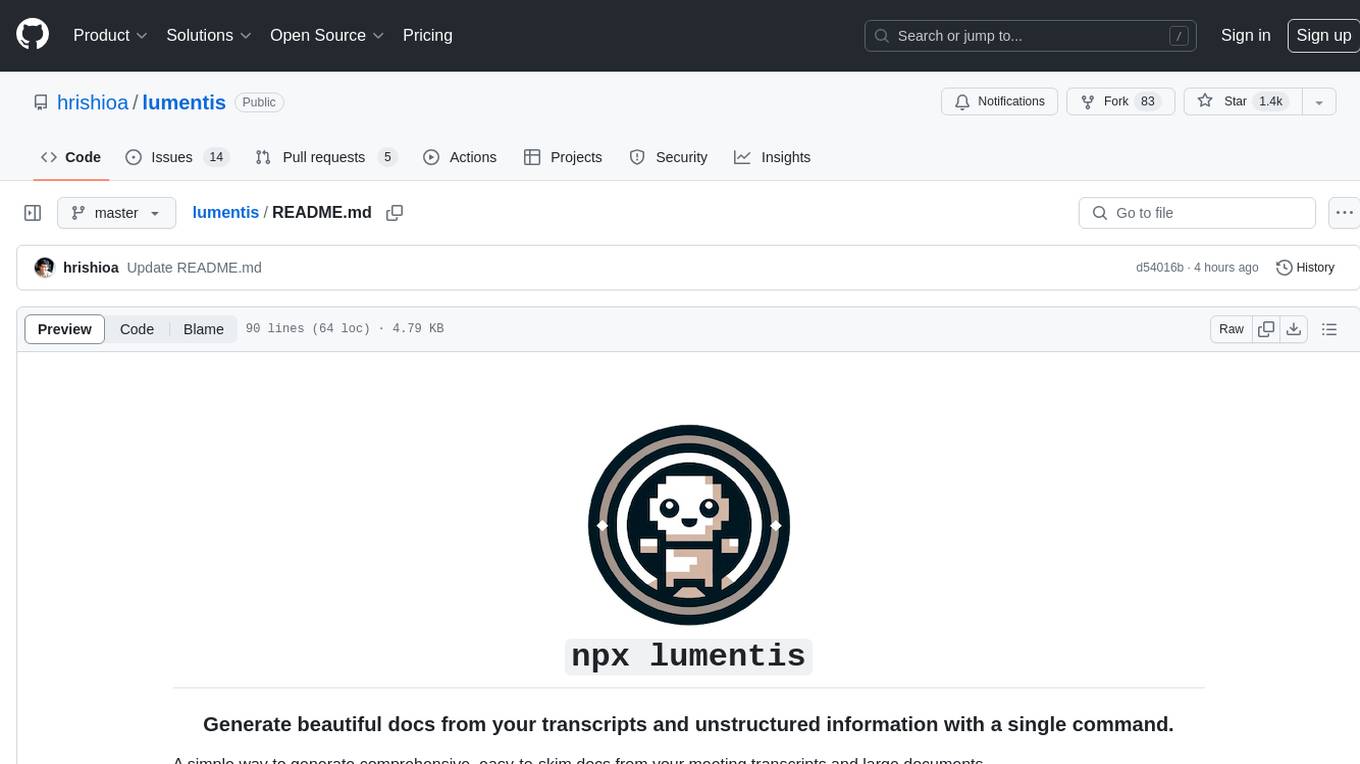
lumentis
Lumentis is a tool that allows users to generate beautiful and comprehensive documentation from meeting transcripts and large documents with a single command. It reads transcripts, asks questions to understand themes and audience, generates an outline, and creates detailed pages with visual variety and styles. Users can switch models for different tasks, control the process, and deploy the generated docs to Vercel. The tool is designed to be open, clean, fast, and easy to use, with upcoming features including folders, PDFs, auto-transcription, website scraping, scientific papers handling, summarization, and continuous updates.
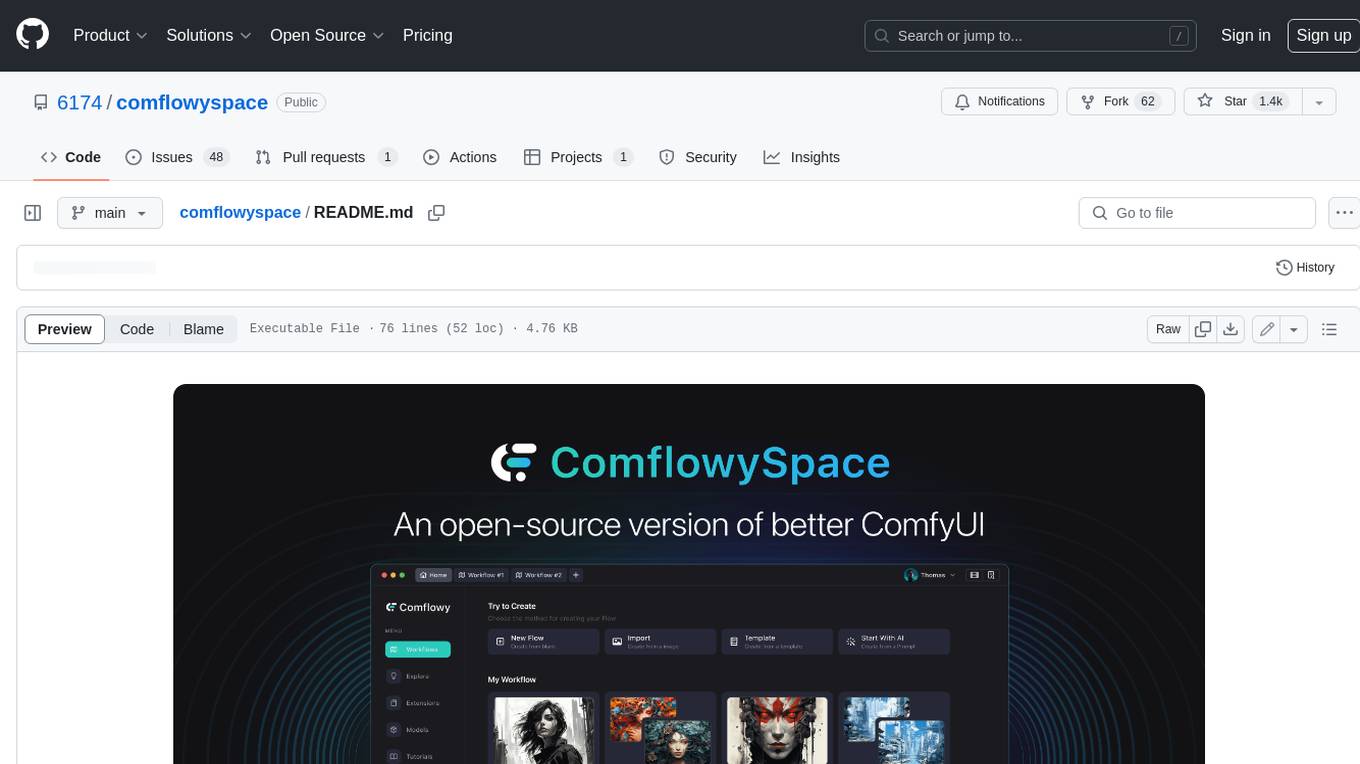
comflowyspace
Comflowyspace is an open-source AI image and video generation tool that aims to provide a more user-friendly and accessible experience than existing tools like SDWebUI and ComfyUI. It simplifies the installation, usage, and workflow management of AI image and video generation, making it easier for users to create and explore AI-generated content. Comflowyspace offers features such as one-click installation, workflow management, multi-tab functionality, workflow templates, and an improved user interface. It also provides tutorials and documentation to lower the learning curve for users. The tool is designed to make AI image and video generation more accessible and enjoyable for a wider range of users.
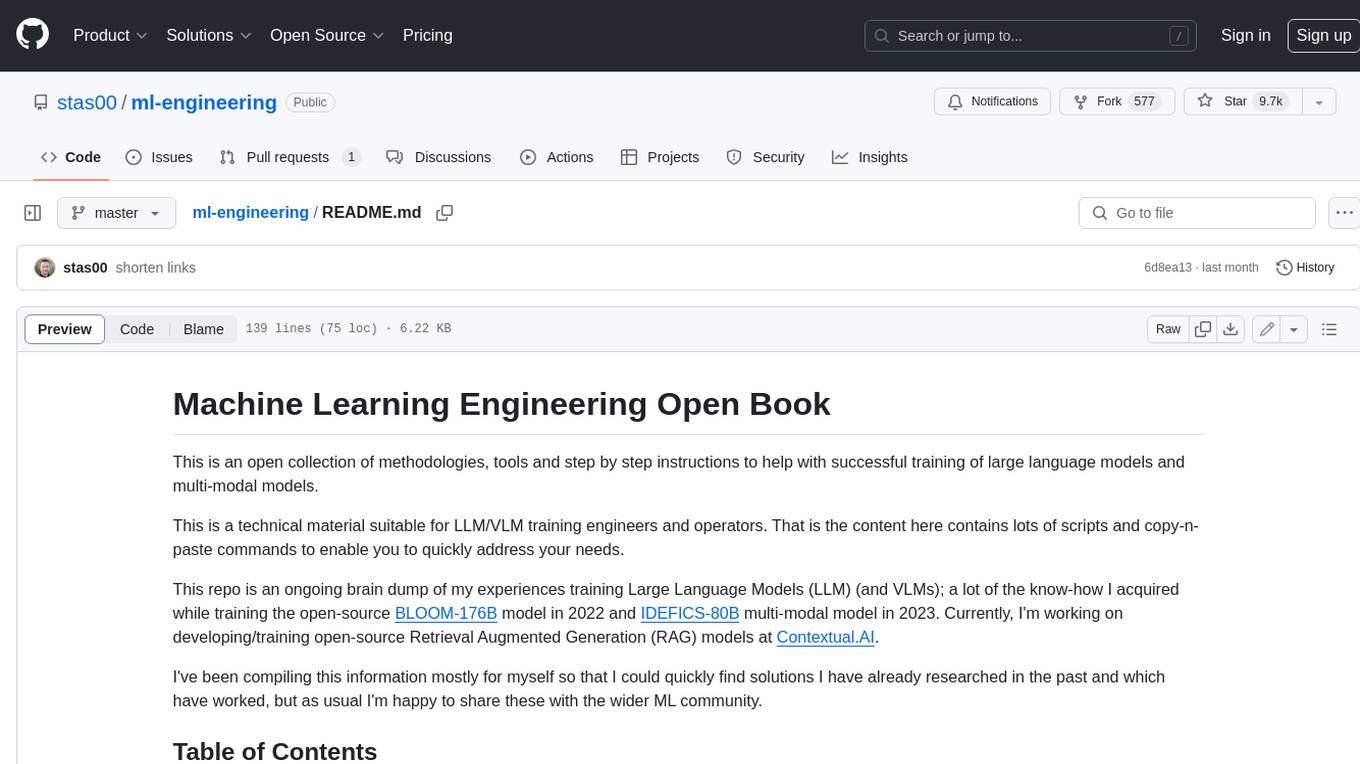
ml-engineering
This repository provides a comprehensive collection of methodologies, tools, and step-by-step instructions for successful training of large language models (LLMs) and multi-modal models. It is a technical resource suitable for LLM/VLM training engineers and operators, containing numerous scripts and copy-n-paste commands to facilitate quick problem-solving. The repository is an ongoing compilation of the author's experiences training BLOOM-176B and IDEFICS-80B models, and currently focuses on the development and training of Retrieval Augmented Generation (RAG) models at Contextual.AI. The content is organized into six parts: Insights, Hardware, Orchestration, Training, Development, and Miscellaneous. It includes key comparison tables for high-end accelerators and networks, as well as shortcuts to frequently needed tools and guides. The repository is open to contributions and discussions, and is licensed under Attribution-ShareAlike 4.0 International.
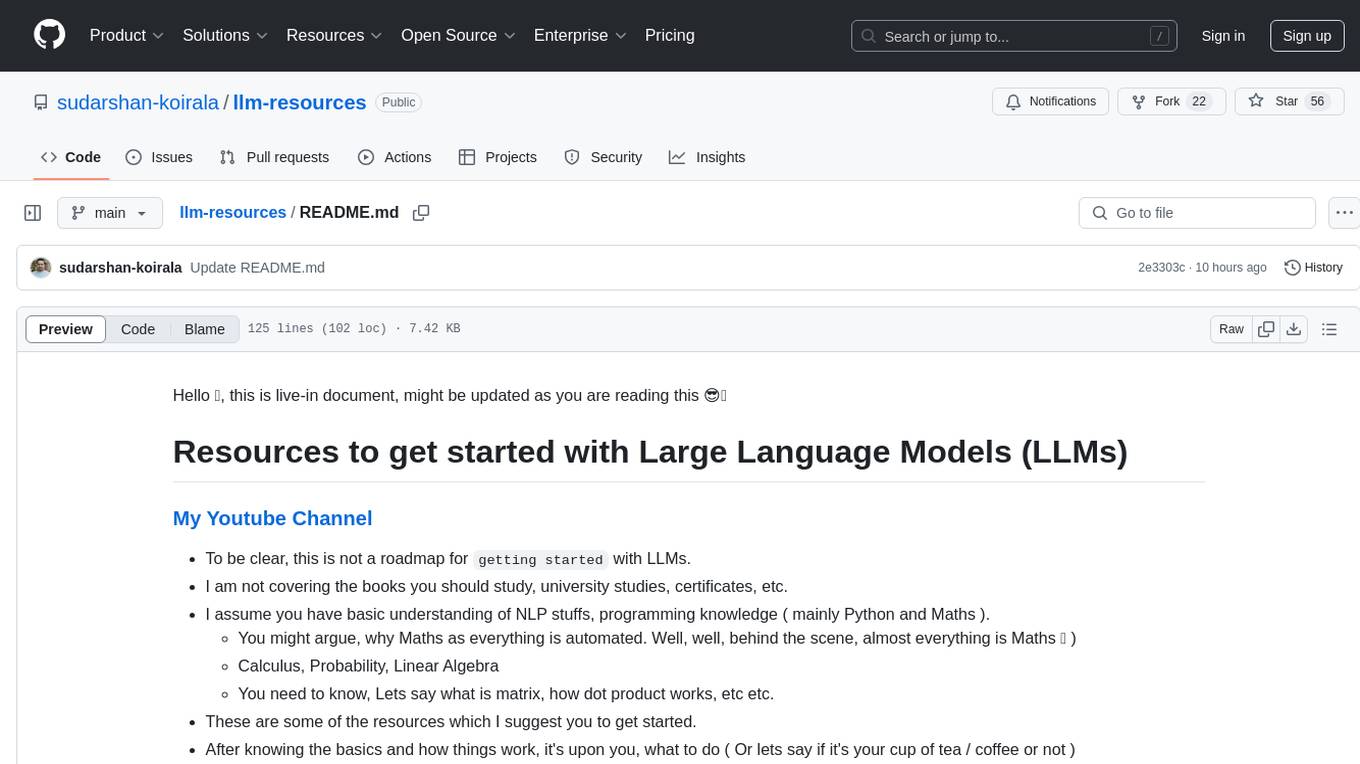
llm-resources
llm-resources is a repository providing resources to get started with Large Language Models (LLMs). It includes videos on Neural Networks and LLMs, free courses, prompt engineering guides, explored frameworks, AI assistants, and tips on making RAG work properly. The repository also contains important links and updates related to LLMs, AWS, RAG, agents, model context protocol, and more. It aims to help individuals with a basic understanding of NLP and programming knowledge to explore and utilize LLMs effectively.
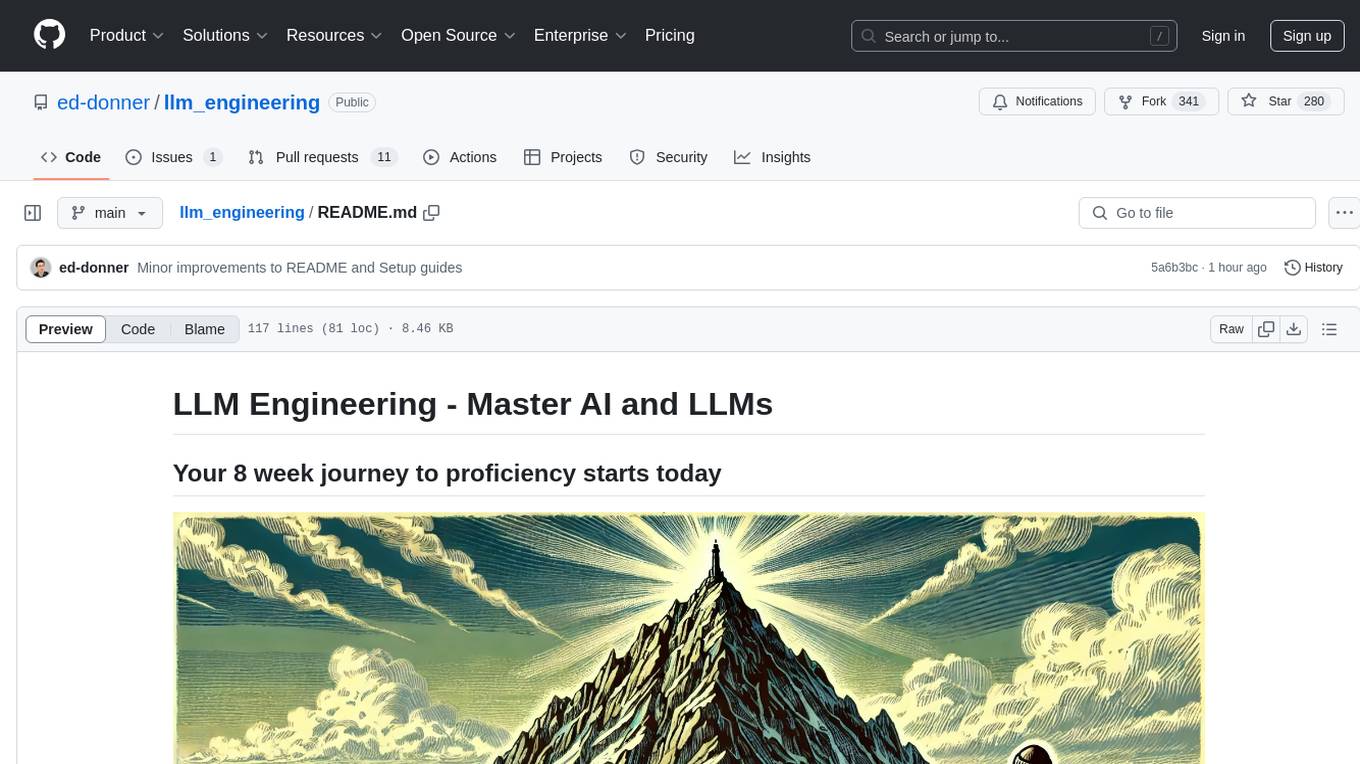
llm_engineering
LLM Engineering is an 8-week course designed to help learners master AI and LLMs through a series of projects that gradually increase in complexity. The course covers setting up the environment, working with APIs, using Google Colab for GPU processing, and building an autonomous Agentic AI solution. Learners are encouraged to actively participate, run code cells, tweak code, and share their progress with the community. The emphasis is on practical, educational projects that teach valuable business skills.
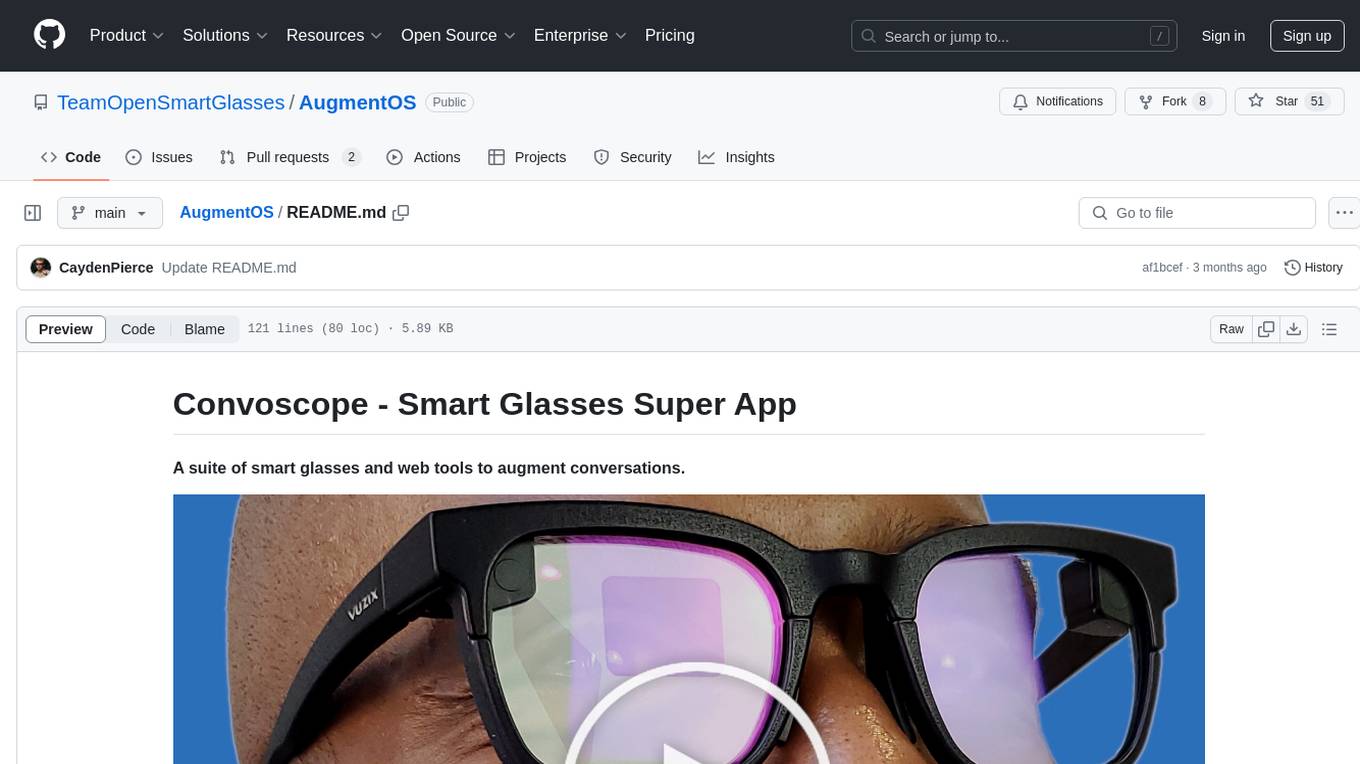
AugmentOS
Convoscope is a suite of smart glasses and web tools designed to augment conversations by providing live proactive agents that answer questions, offer definitions, insights, and alternative viewpoints. It includes features like 'Mira' AI Assistant, Convoscope Proactive AI Agents, Language Learning app, Screen Mirror functionality, and upcoming features such as Live Captions, ADHD Glasses, and Live Language Translation. The tool supports various smart glasses models and Android 12+ phones, offering a unique experience for real-life conversations, meetings, and video calls.
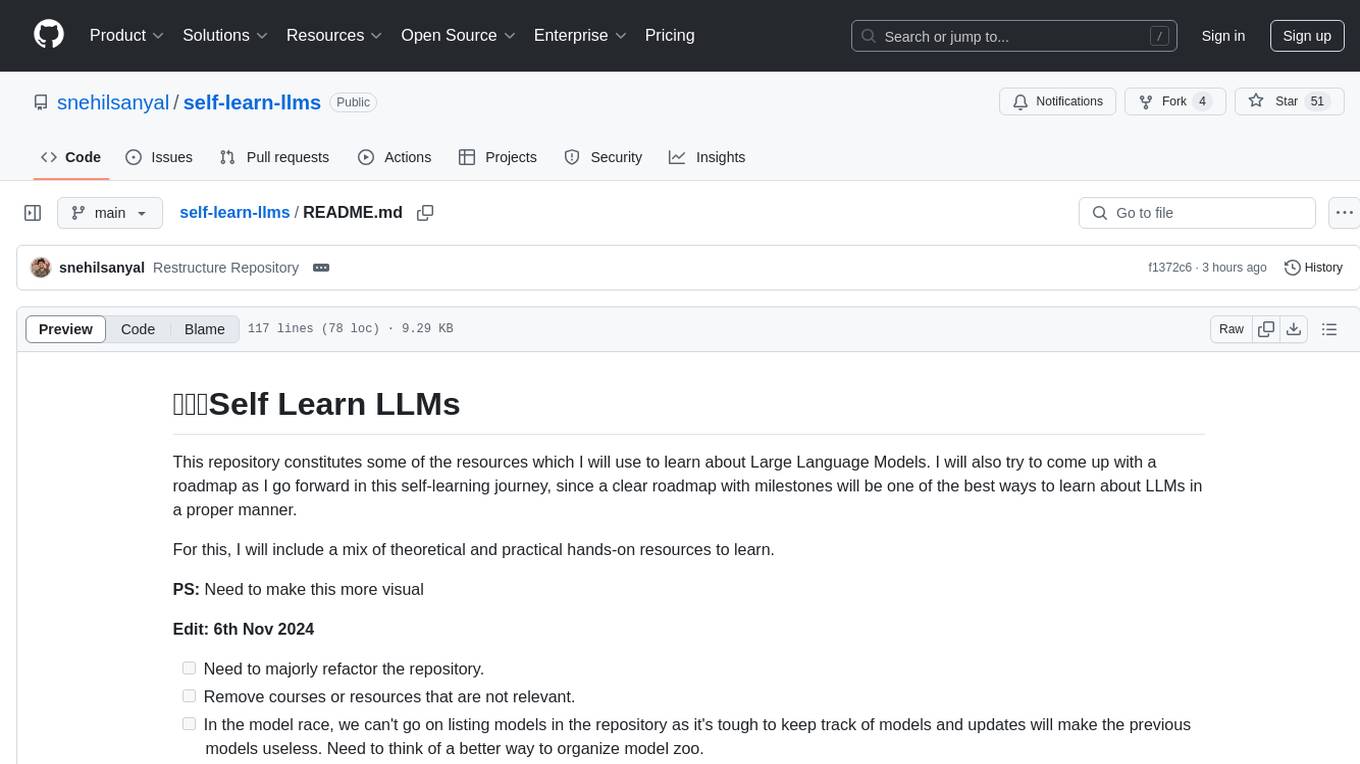
self-learn-llms
Self Learn LLMs is a repository containing resources for self-learning about Large Language Models. It includes theoretical and practical hands-on resources to facilitate learning. The repository aims to provide a clear roadmap with milestones for proper understanding of LLMs. The owner plans to refactor the repository to remove irrelevant content, organize model zoo better, and enhance the learning experience by adding contributors and hosting notes, tutorials, and open discussions.

CodeProject.AI-Server
CodeProject.AI Server is a standalone, self-hosted, fast, free, and open-source Artificial Intelligence microserver designed for any platform and language. It can be installed locally without the need for off-device or out-of-network data transfer, providing an easy-to-use solution for developers interested in AI programming. The server includes a HTTP REST API server, backend analysis services, and the source code, enabling users to perform various AI tasks locally without relying on external services or cloud computing. Current capabilities include object detection, face detection, scene recognition, sentiment analysis, and more, with ongoing feature expansions planned. The project aims to promote AI development, simplify AI implementation, focus on core use-cases, and leverage the expertise of the developer community.
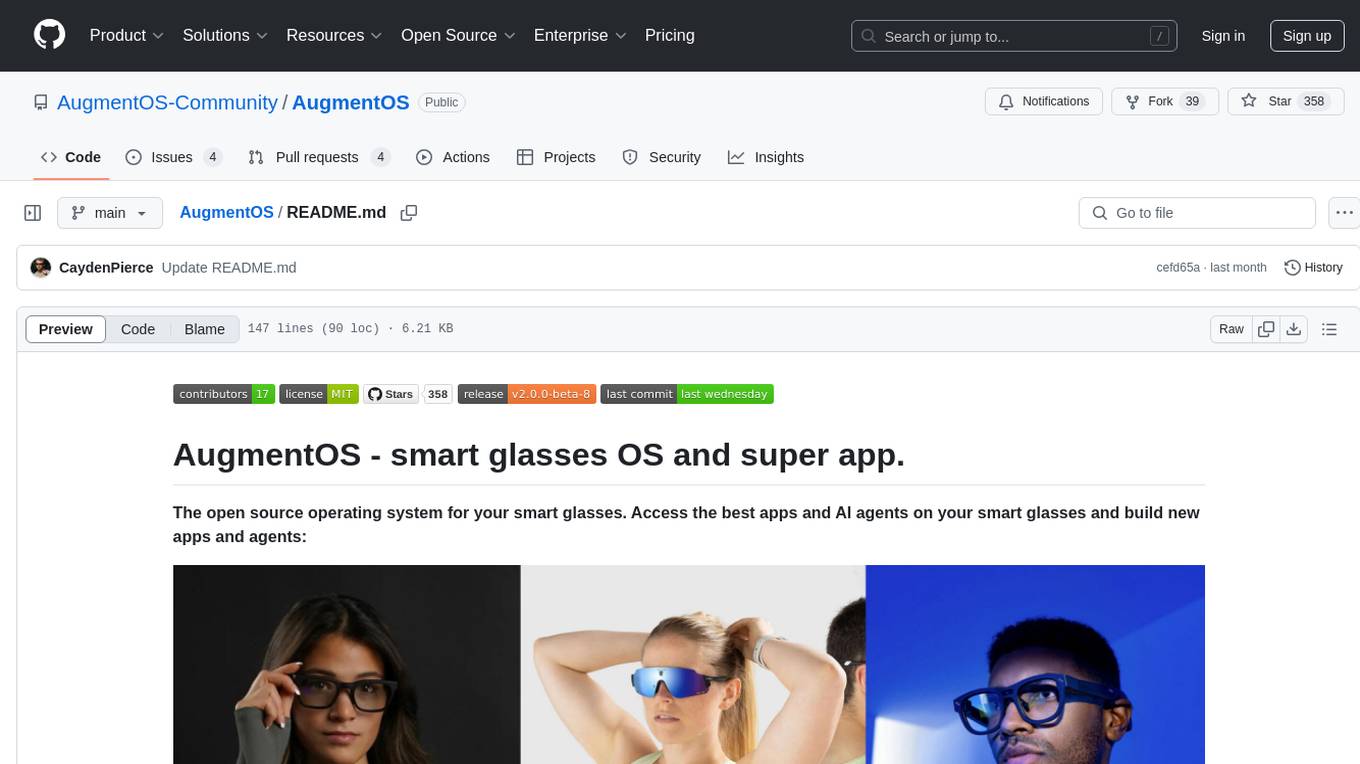
AugmentOS
AugmentOS is an open source operating system for smart glasses that allows users to access various apps and AI agents. It enables developers to easily build and run apps on smart glasses, run multiple apps simultaneously, and interact with AI assistants, translation services, live captions, and more. The platform also supports language learning, ADHD tools, and live language translation. AugmentOS is designed to enhance the user experience of smart glasses by providing a seamless and proactive interaction with AI-first wearables apps.
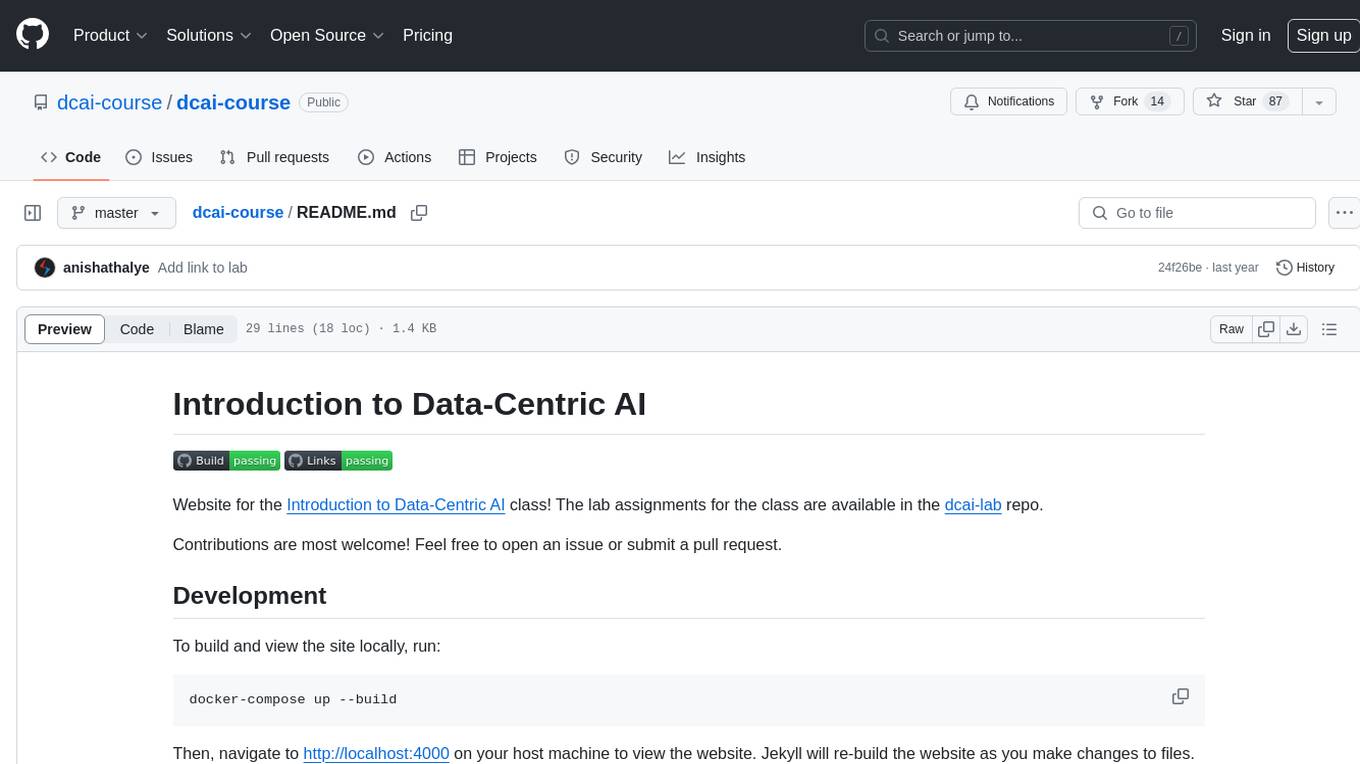
dcai-course
This repository serves as the website for the Introduction to Data-Centric AI class. It contains lab assignments and resources for the course. Users can contribute by opening issues or submitting pull requests. The website can be built locally using Docker and Jekyll. The design is based on Missing Semester. All contents, including source code, lecture notes, and videos, are licensed under CC BY-NC-SA 4.0.
For similar tasks

ai_summer
AI Summer is a repository focused on providing workshops and resources for developing foundational skills in generative AI models and transformer models. The repository offers practical applications for inferencing and training, with a specific emphasis on understanding and utilizing advanced AI chat models like BingGPT. Participants are encouraged to engage in interactive programming environments, decide on projects to work on, and actively participate in discussions and breakout rooms. The workshops cover topics such as generative AI models, retrieval-augmented generation, building AI solutions, and fine-tuning models. The goal is to equip individuals with the necessary skills to work with AI technologies effectively and securely, both locally and in the cloud.
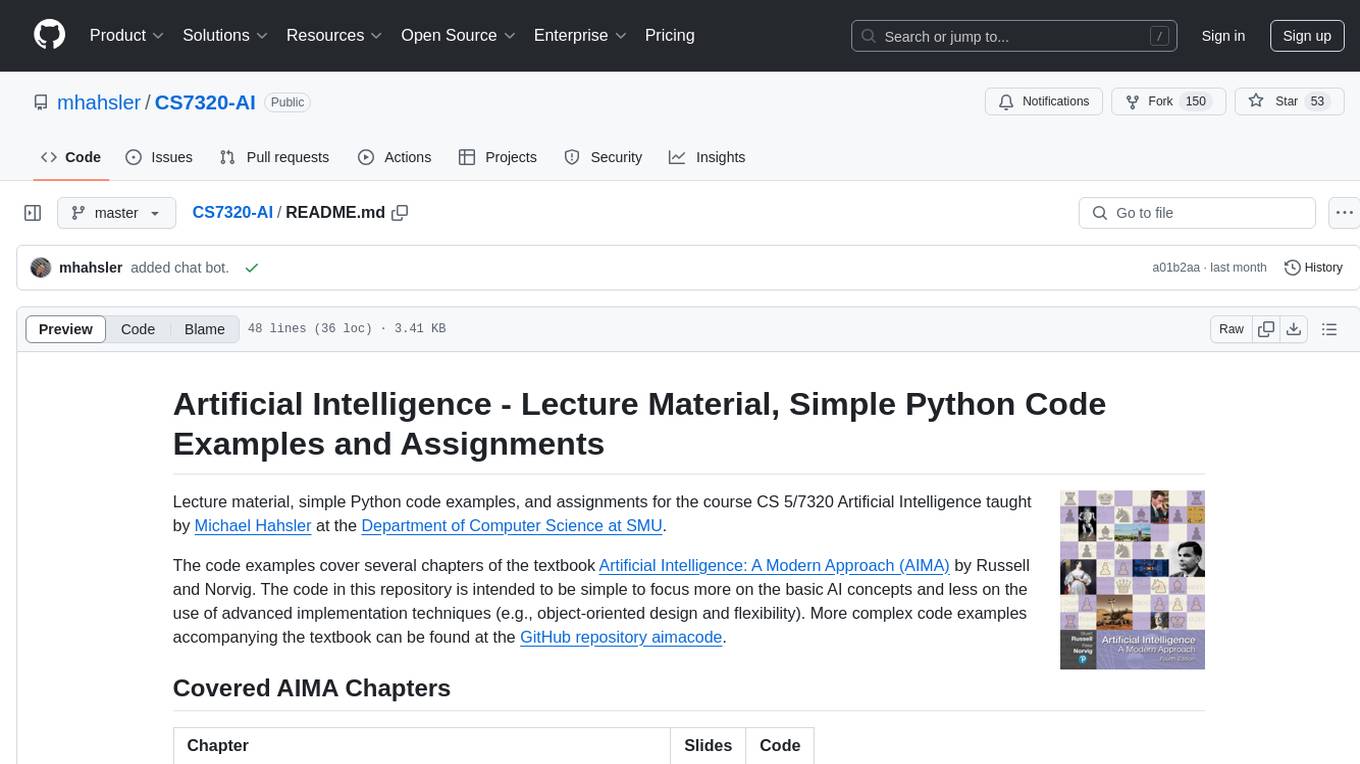
CS7320-AI
CS7320-AI is a repository containing lecture materials, simple Python code examples, and assignments for the course CS 5/7320 Artificial Intelligence. The code examples cover various chapters of the textbook 'Artificial Intelligence: A Modern Approach' by Russell and Norvig. The repository focuses on basic AI concepts rather than advanced implementation techniques. It includes HOWTO guides for installing Python, working on assignments, and using AI with Python.
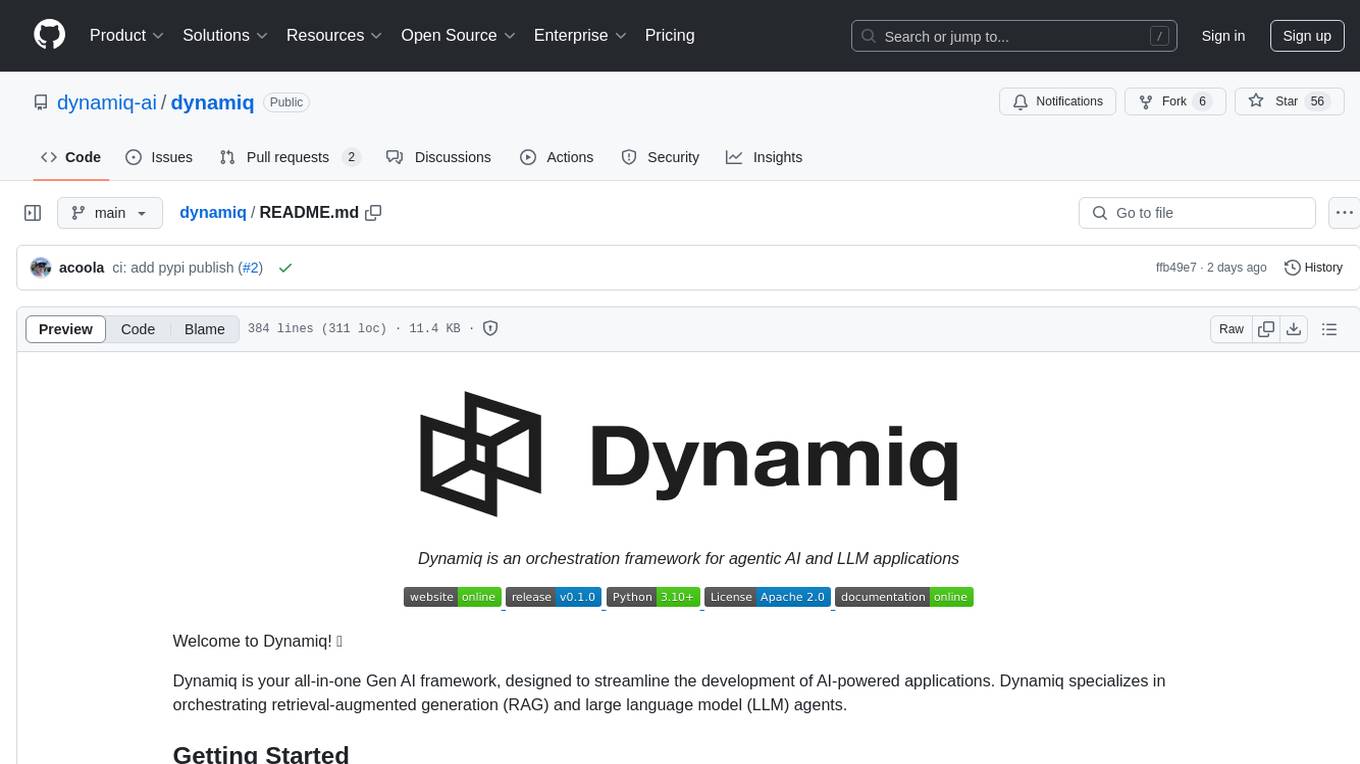
dynamiq
Dynamiq is an orchestration framework designed to streamline the development of AI-powered applications, specializing in orchestrating retrieval-augmented generation (RAG) and large language model (LLM) agents. It provides an all-in-one Gen AI framework for agentic AI and LLM applications, offering tools for multi-agent orchestration, document indexing, and retrieval flows. With Dynamiq, users can easily build and deploy AI solutions for various tasks.
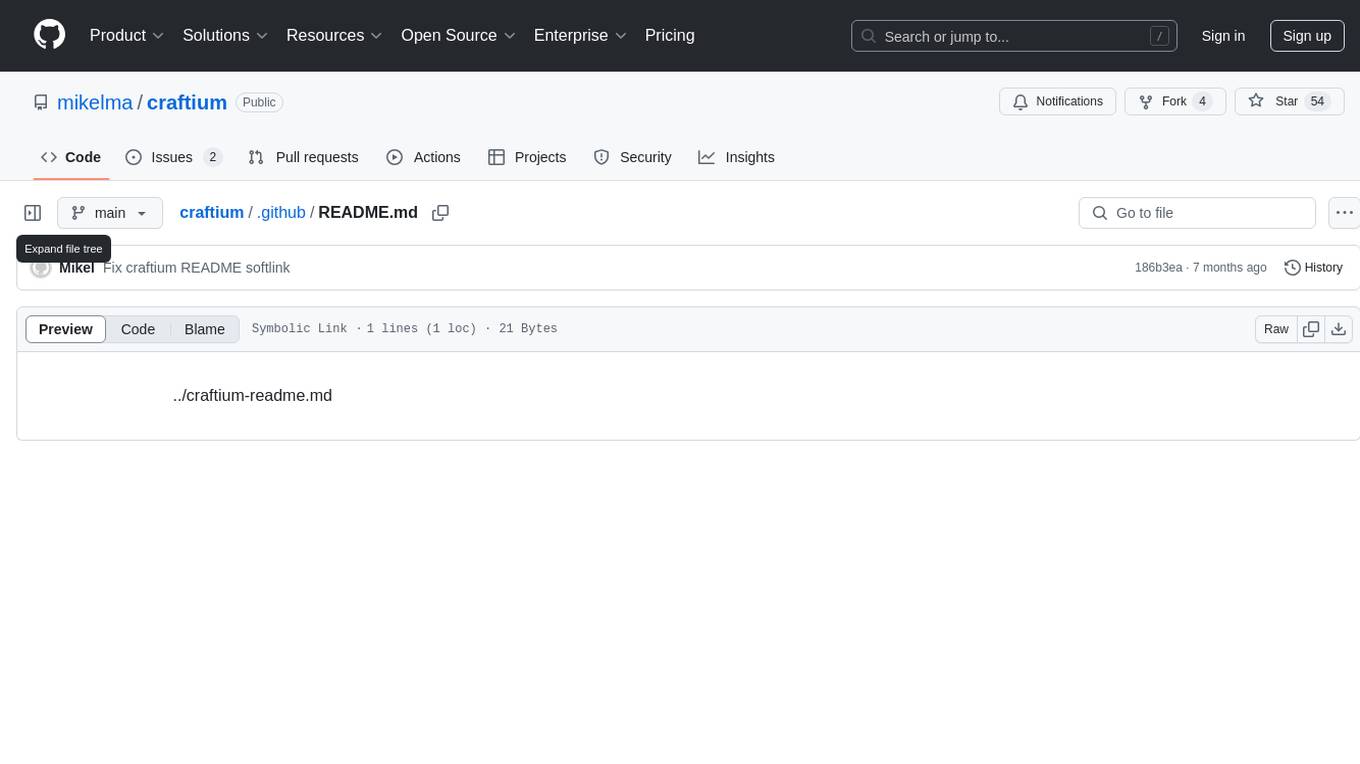
craftium
Craftium is an open-source platform based on the Minetest voxel game engine and the Gymnasium and PettingZoo APIs, designed for creating fast, rich, and diverse single and multi-agent environments. It allows for connecting to Craftium's Python process, executing actions as keyboard and mouse controls, extending the Lua API for creating RL environments and tasks, and supporting client/server synchronization for slow agents. Craftium is fully extensible, extensively documented, modern RL API compatible, fully open source, and eliminates the need for Java. It offers a variety of environments for research and development in reinforcement learning.
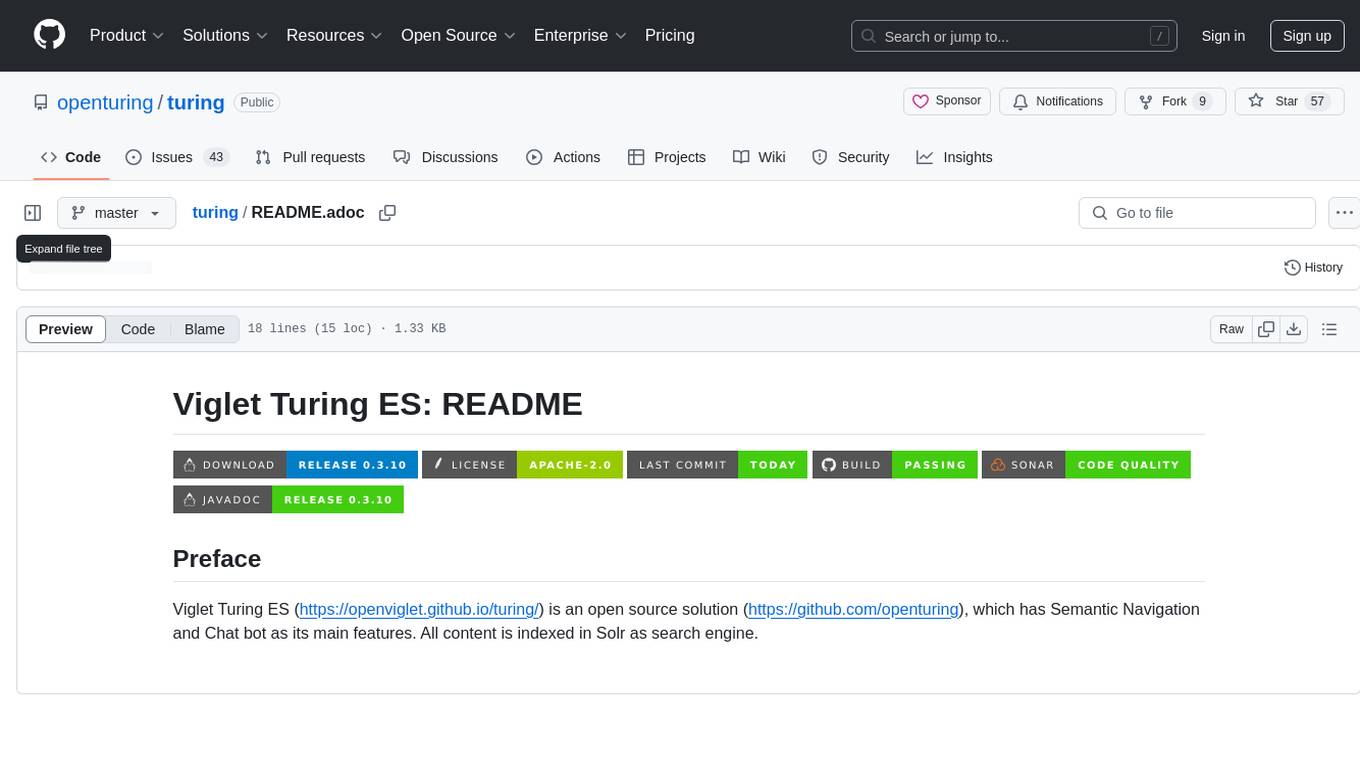
turing
Viglet Turing ES is an open source solution with Semantic Navigation and Chat bot features. It indexes all content in Solr as a search engine.
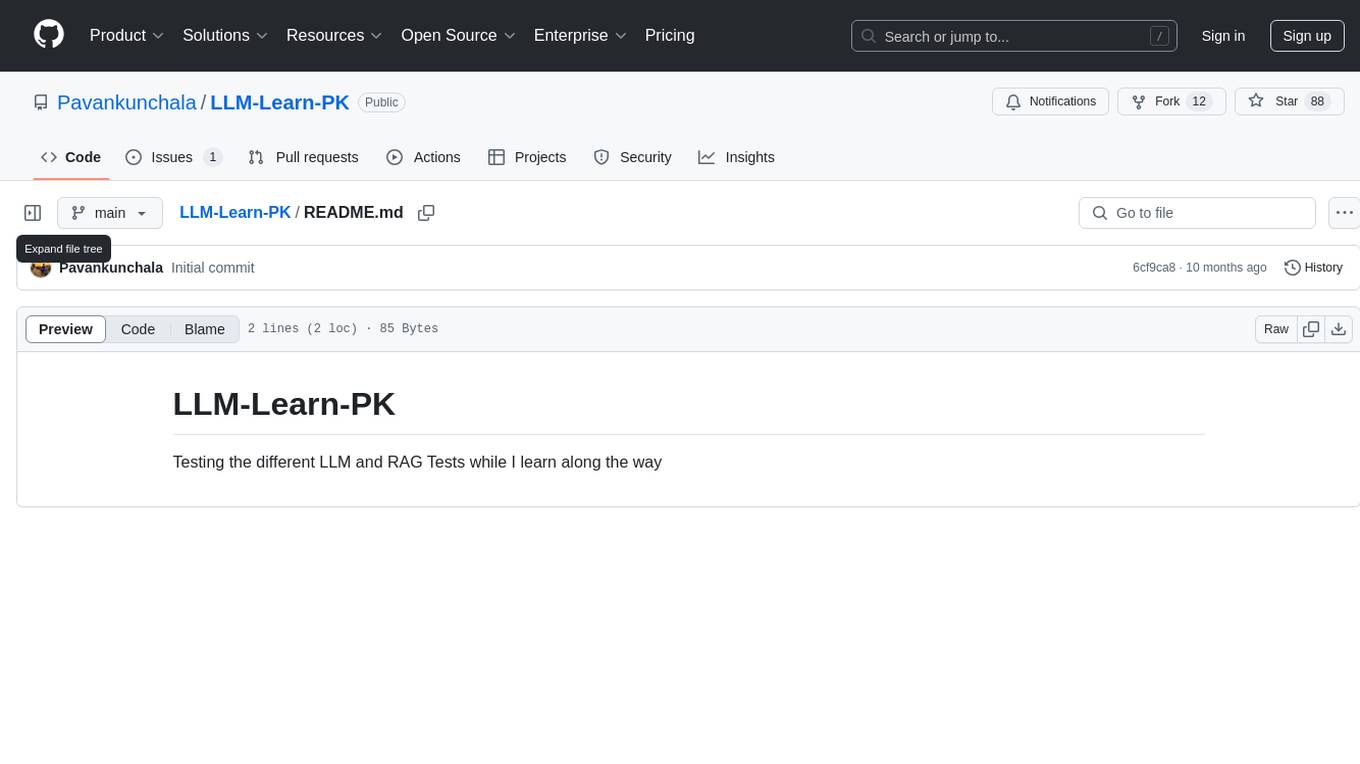
LLM-Learn-PK
LLM-Learn-PK is a repository for testing various LLM and RAG tests. It serves as a learning platform where the creator experiments with different tests and learns in the process.
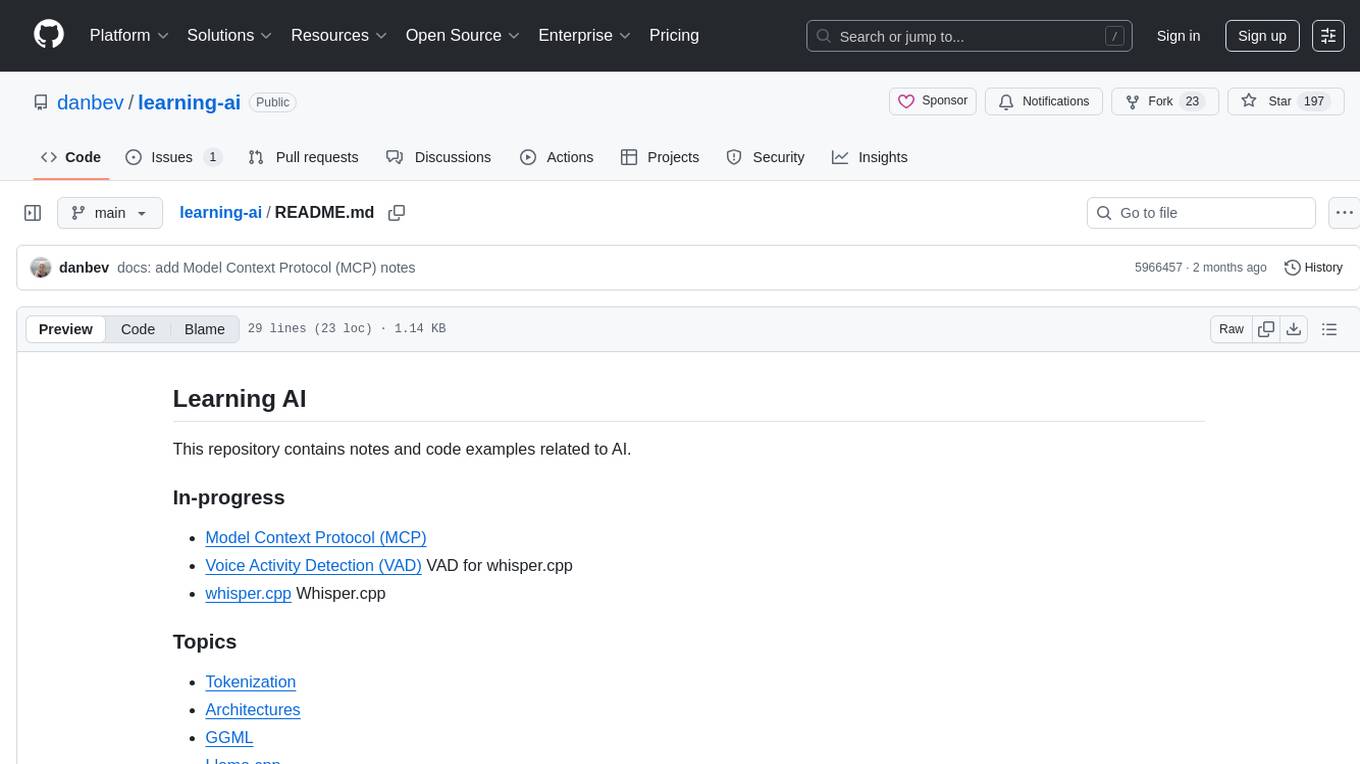
learning-ai
This repository is a collection of notes and code examples related to AI, covering topics such as Tokenization, Architectures, GGML, Llama.cpp, Position Embeddings, GPUs, Vector Databases, and Vision. It also includes in-progress work on Model Context Protocol (MCP) and Voice Activity Detection (VAD) for whisper.cpp. The repository offers exploration code for various AI-related concepts and tools like GGML, Llama.cpp, GPU technologies (CUDA, Kompute, Metal, OpenCL, ROCm, Vulkan), Word embeddings, Huggingface API, and Qdrant Vector Database in both Rust and Python.
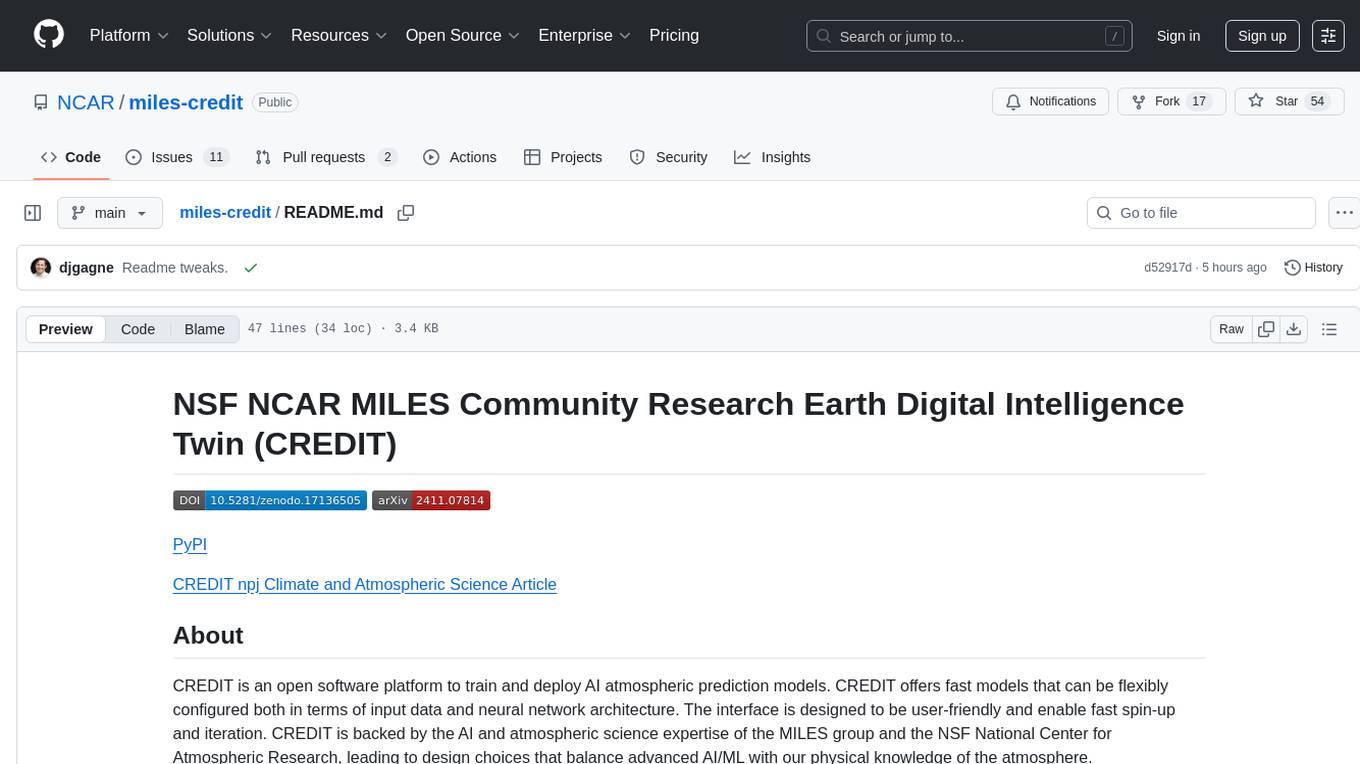
miles-credit
CREDIT is an open software platform for training and deploying AI atmospheric prediction models. It offers fast models with flexible configuration options for input data and neural network architecture. The user-friendly interface enables quick setup and iteration. Developed by the MILES group and NSF National Center for Atmospheric Research, CREDIT combines advanced AI/ML with atmospheric science expertise. It provides a stable release with various models, training, and deployment options, with ongoing development. Detailed documentation is available for installation, training, deployment, config file interpretation, and API usage.
For similar jobs

NanoLLM
NanoLLM is a tool designed for optimized local inference for Large Language Models (LLMs) using HuggingFace-like APIs. It supports quantization, vision/language models, multimodal agents, speech, vector DB, and RAG. The tool aims to provide efficient and effective processing for LLMs on local devices, enhancing performance and usability for various AI applications.
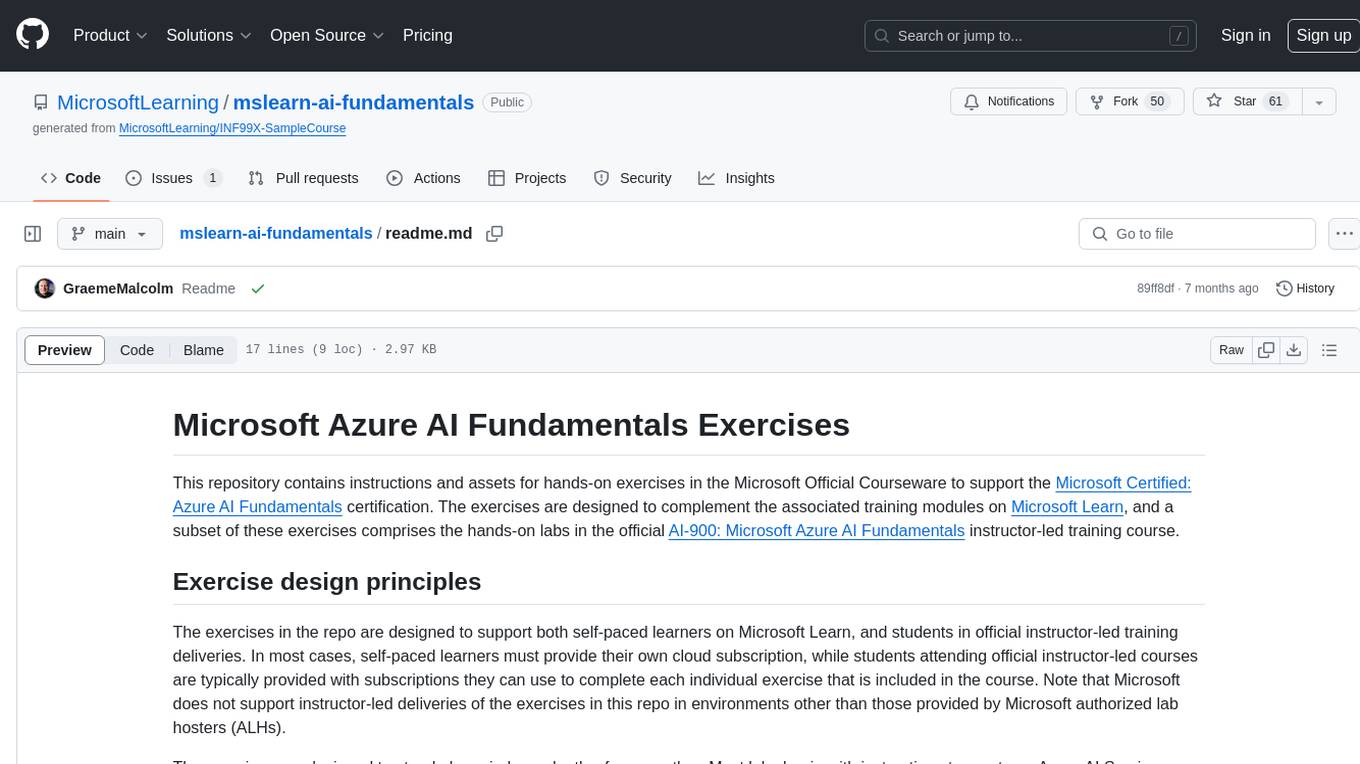
mslearn-ai-fundamentals
This repository contains materials for the Microsoft Learn AI Fundamentals module. It covers the basics of artificial intelligence, machine learning, and data science. The content includes hands-on labs, interactive learning modules, and assessments to help learners understand key concepts and techniques in AI. Whether you are new to AI or looking to expand your knowledge, this module provides a comprehensive introduction to the fundamentals of AI.

awesome-ai-tools
Awesome AI Tools is a curated list of popular tools and resources for artificial intelligence enthusiasts. It includes a wide range of tools such as machine learning libraries, deep learning frameworks, data visualization tools, and natural language processing resources. Whether you are a beginner or an experienced AI practitioner, this repository aims to provide you with a comprehensive collection of tools to enhance your AI projects and research. Explore the list to discover new tools, stay updated with the latest advancements in AI technology, and find the right resources to support your AI endeavors.
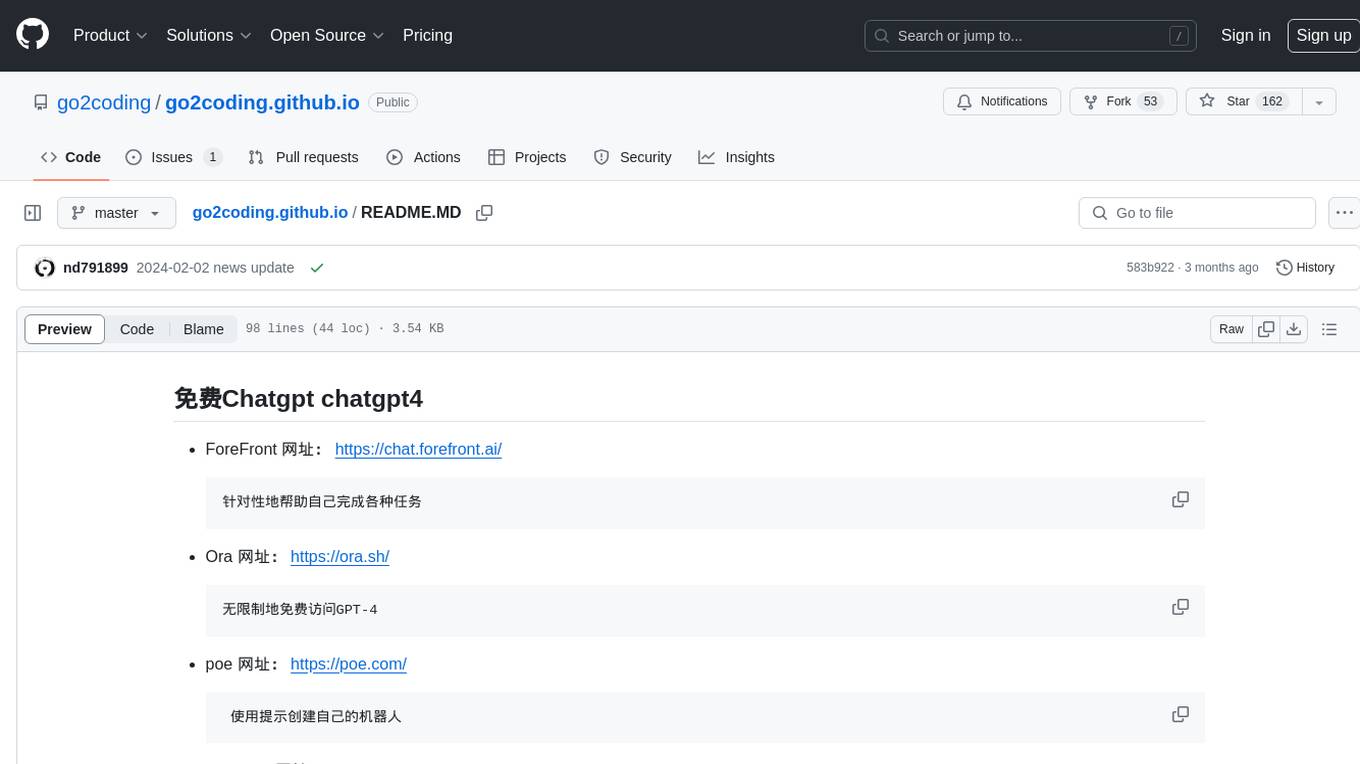
go2coding.github.io
The go2coding.github.io repository is a collection of resources for AI enthusiasts, providing information on AI products, open-source projects, AI learning websites, and AI learning frameworks. It aims to help users stay updated on industry trends, learn from community projects, access learning resources, and understand and choose AI frameworks. The repository also includes instructions for local and external deployment of the project as a static website, with details on domain registration, hosting services, uploading static web pages, configuring domain resolution, and a visual guide to the AI tool navigation website. Additionally, it offers a platform for AI knowledge exchange through a QQ group and promotes AI tools through a WeChat public account.
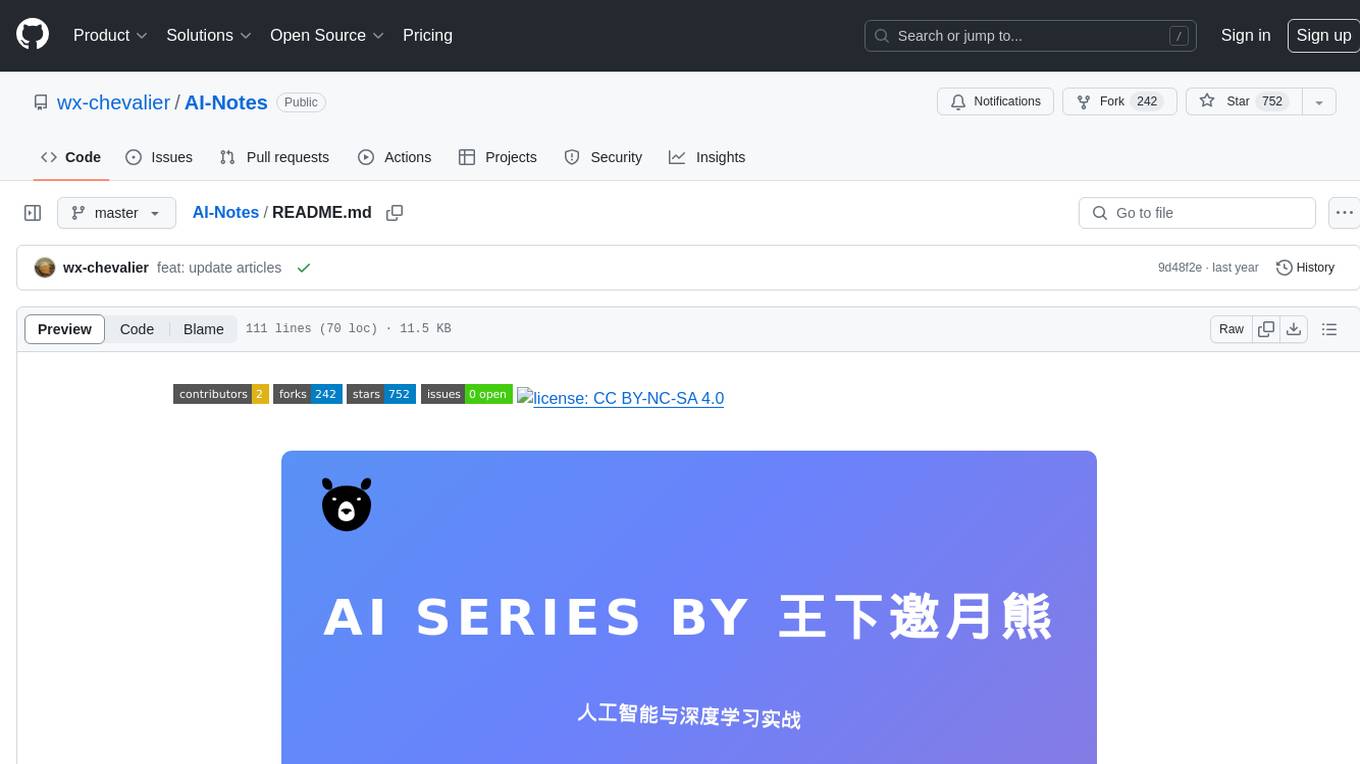
AI-Notes
AI-Notes is a repository dedicated to practical applications of artificial intelligence and deep learning. It covers concepts such as data mining, machine learning, natural language processing, and AI. The repository contains Jupyter Notebook examples for hands-on learning and experimentation. It explores the development stages of AI, from narrow artificial intelligence to general artificial intelligence and superintelligence. The content delves into machine learning algorithms, deep learning techniques, and the impact of AI on various industries like autonomous driving and healthcare. The repository aims to provide a comprehensive understanding of AI technologies and their real-world applications.
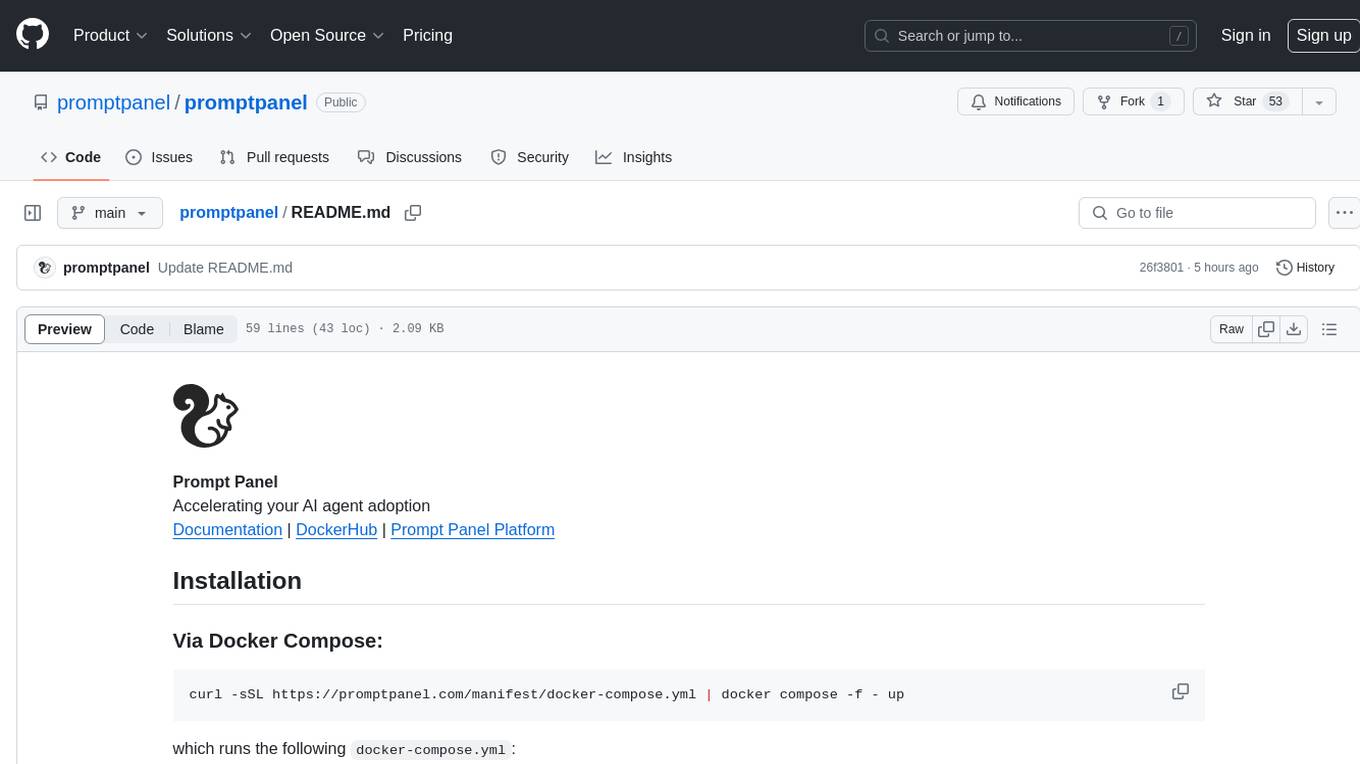
promptpanel
Prompt Panel is a tool designed to accelerate the adoption of AI agents by providing a platform where users can run large language models across any inference provider, create custom agent plugins, and use their own data safely. The tool allows users to break free from walled-gardens and have full control over their models, conversations, and logic. With Prompt Panel, users can pair their data with any language model, online or offline, and customize the system to meet their unique business needs without any restrictions.
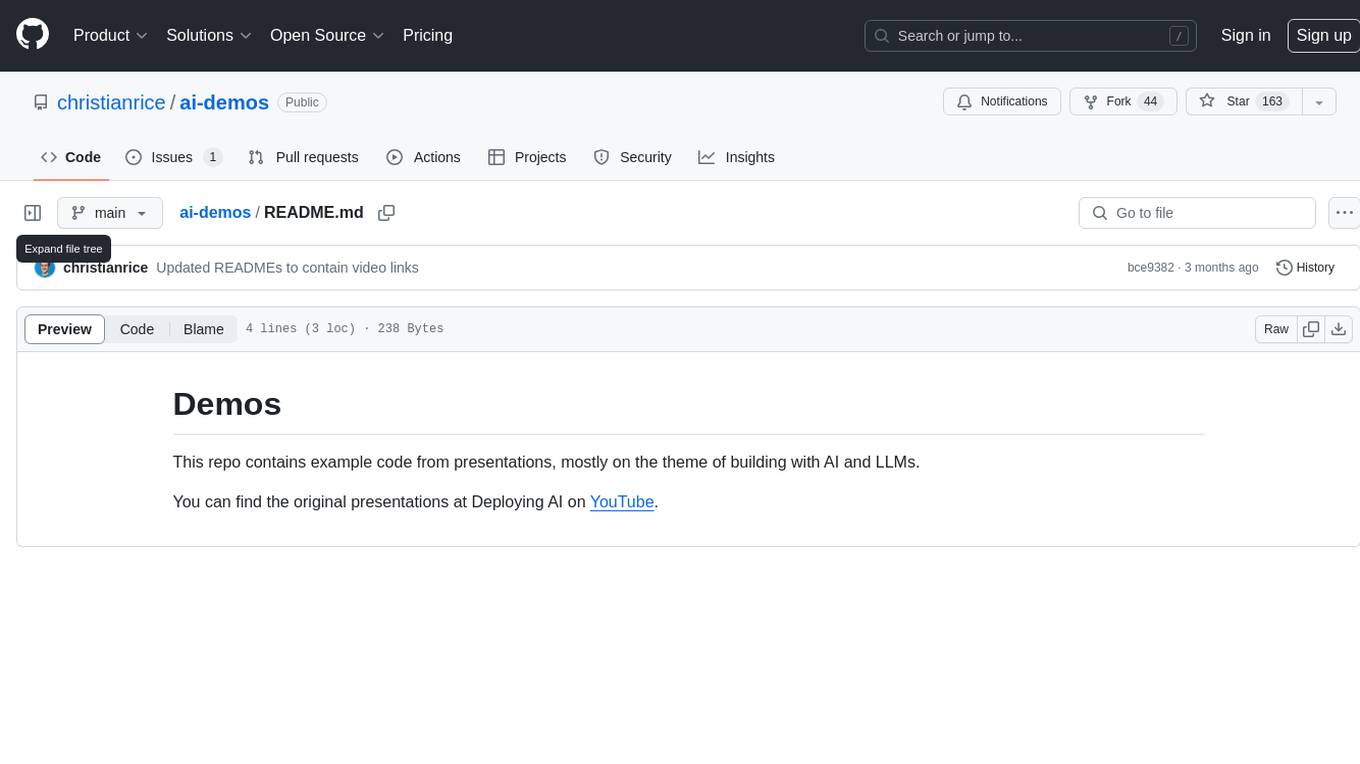
ai-demos
The 'ai-demos' repository is a collection of example code from presentations focusing on building with AI and LLMs. It serves as a resource for developers looking to explore practical applications of artificial intelligence in their projects. The code snippets showcase various techniques and approaches to leverage AI technologies effectively. The repository aims to inspire and educate developers on integrating AI solutions into their applications.

ai_summer
AI Summer is a repository focused on providing workshops and resources for developing foundational skills in generative AI models and transformer models. The repository offers practical applications for inferencing and training, with a specific emphasis on understanding and utilizing advanced AI chat models like BingGPT. Participants are encouraged to engage in interactive programming environments, decide on projects to work on, and actively participate in discussions and breakout rooms. The workshops cover topics such as generative AI models, retrieval-augmented generation, building AI solutions, and fine-tuning models. The goal is to equip individuals with the necessary skills to work with AI technologies effectively and securely, both locally and in the cloud.


